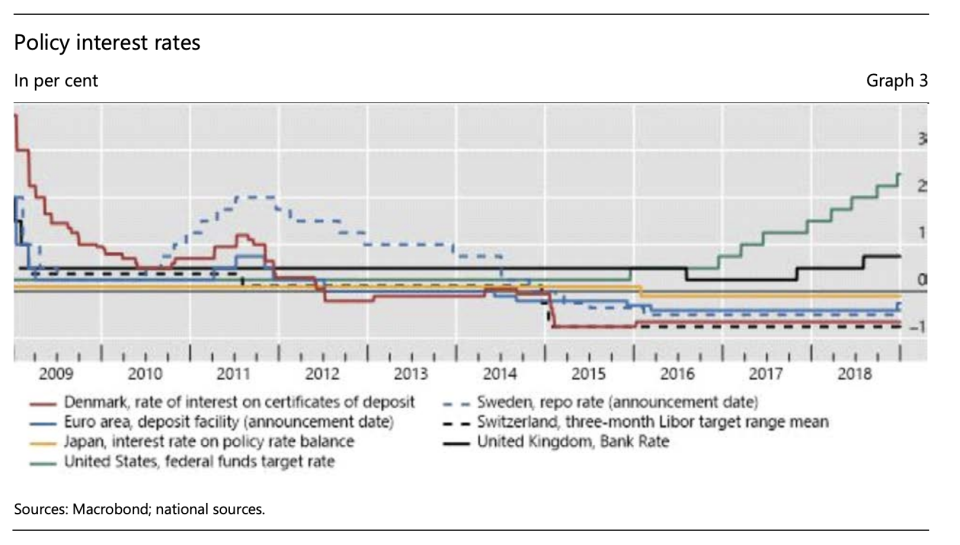Central banks say negative interest rates have been 'effective'
Central banks backed negative interest rate policies in a new survey released Monday, arguing that the unconventional monetary policy tool was “fairly effective” in easing financial conditions in many corners of the world.
The Bank for International Settlements, the organization run by 60 central banks from around the world, released a report praising negative interest rates for providing expansionary stimulus. The BIS claimed that negative interest rates did not appear to damage bank profitability or encourage cash hoarding.
"[C]entral banks judged that negative policy rates contributed to the achievement of their policy goals and that their side effects have been contained,” the BIS report read.
The BIS noted that the scope of its review covered “modestly” negative interest rates and cautioned that its effectiveness thus far could be different if rates fall further. The central banks surveyed also said the longer-term effects of the unprecedented policy “cannot be fully assessed on the basis of current experience.”
Several member central banks of the BIS have pursued negative interest rate policy, which charges financial institutions for storing reserves at the central bank. Whereas “conventional” interest rate policy would reward a bank for leaving money at the central bank, negative interest rates would incentivize banks to withdraw its reserves and instead use that money for other purposes, like lending.
Because negative interest rate policies are a relatively new tool, its effectiveness in fighting macroeconomic headwinds are still up for debate, as are its side effects on financial markets and consumer behavior.
In 2009, the Swedish Riksbank became the first central bank to implement such a policy. Amid sluggish macroeconomic factors, the European Central Bank, the Danmarks Nationalbank, the Swiss National Bank, and the Bank of Japan all introduced negative interest rates between 2014 and 2016.

The Federal Reserve is steering interest rates in a range of between 1.75% and 2%, some distance from the zero-bound, but Chairman Jerome Powell has said he would prefer quantitative easing over negative interest rate policies to battle the next crisis.
“I do not think we’d be looking at using negative rates,” Powell said in a press conference Sept. 18. “I just don’t think those will be at the top of our list.”
Powell said the Fed had considered negative interest rates during the financial crisis but had ultimately turned to large-scale asset purchases and forward guidance instead.
Negative impacts from negative rates?
The BIS report says that negative rates were able to lower long-term yields in line with short-term yields, signaling that markets were reacting to a commitment to easier monetary policy.
The central banks reported that money market rates declined and that at least in the euro area, rate cuts have appeared to reduce lending rates and increase loan volume.
The survey added that financial institutions did not appear to be too squeezed on profitability. The BIS said net interest margin, a key measure of interest earned on loans minus interest paid on deposits, were compressed by negative interest rates but said banks were able to counteract those impacts by investing in riskier assets or raising fees.
Regarding concerns over cash hoarding as a result of negative rates on deposits, the survey said negative interest rates were not ultimately passed onto retail deposits, meaning consumers did not pull their deposits en masse.
The BIS cautioned that there are some dangers to negative interest rates, such as creating “frothy” stock valuations and distortions in short-term money market and government bond market liquidity.
Brian Cheung is a reporter covering the banking industry and the intersection of finance and policy for Yahoo Finance. You can follow him on Twitter @bcheungz.
Boston Fed's Rosengren: US economy 'consistent with staying where we are'
New Wells Fargo CEO will again run a West Coast-based company from NYC
Boston Fed’s Rosengren: Lower rates could expose co-working companies like WeWork
‘The weirdest place in the world’: What the Fed missed in Jackson Hole
Read the latest financial and business news from Yahoo Finance
Follow Yahoo Finance on Twitter, Facebook, Instagram, Flipboard, SmartNews, LinkedIn, YouTube, and reddit.
